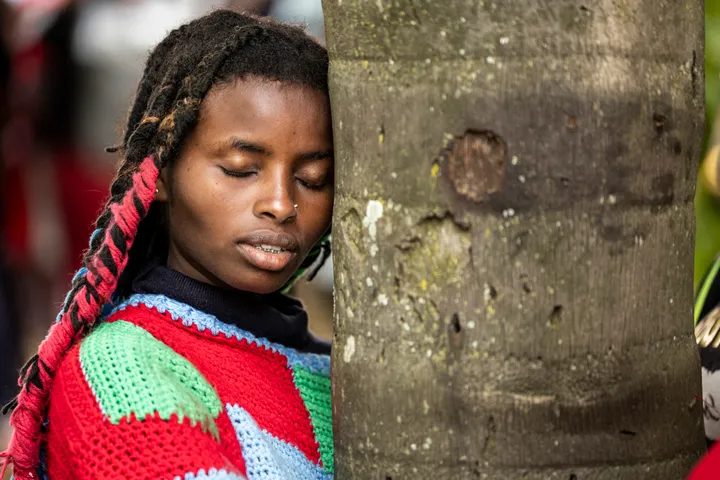By Coletta Wanjohi
In November last year, Tuvalu unveiled plans to build a digital version of itself so that the tiny Pacific island could live on in the metaverse if it is swallowed by the rising sea.
The announcement during the COP 27 climate conference in Egypt appeared straight out of a futuristic sci-fi blockbuster from Hollywood.
But there is nothing even remotely fictitious in the threat faced by island nations from rising seas – the combined effects of global warming and melting Arctic glaciers.
Thousands of km from Tuvalu, Maxime Georges grew up watching the sea getting closer and closer to his home and hearth in Mahe, one of the 115 islands that make up Seychelles on the Indian Ocean.
“Growing up here, these beaches have been our playgrounds,” the 35-year-old Georges tells TRT Afrika. “About two decades ago, the water used to be far from the land, but now, as you can see, it is coming closer to our roads.”
Georges has a shop by the beach in Victoria – the capital of Seychelles – where he sells clothes and bags, primarily to tourists who flock by the thousands to the picture-postcard island cluster famous for its pristine beaches and exotic wildlife.
As more and more island nations and coastal cities in Africa face the threat of being submerged by the rising seas, governments and experts have sounded the alarm over the potential disaster.
The Intergovernmental Panel on Climate Change projects that the global average sea level rise by the year 2100 will be between 8 to 34 inches or nearly three feet in the worst-case scenario.
Water world!
For 50-year-old fisherman James Jewell, the Beau Vallon Beach on Mahe island appears to have shrunk considerably over the years.
And along with the rising seas come other problems – reduction in fish stock due to a loss of the coral reefs that once sustained fodder for marine life.
“We were born by the sea, we have lived by the sea, we know everything about the sea,” he tells TRT Afrika. “Long time ago, there were lots of fish, but now their numbers are declining.”
Over the years, some tree species that grew by the beach have also disappeared, he says. Below the crystal-clear waters, the coral reefs – a habitat of marine life like sponges, oysters, clams and crabs – have been affected by climate change.
The Reef Resilience Network, which focuses on strengthening the management of coral reefs, says the 1998 El Nino contributed to the mass bleaching of the coral reefs. Another El Nino in 2016 was catastrophic.
Bleaching occurs when the corals react by expelling algae because of conditions like heat or pollution. Without their nutrients, they starve. The corals also act as a natural barrier between the sea and land.
For the roughly 98,000 residents of the country – 90 percent of whom live in Victoria – the possibility of their low-lying islands disappearing into the sea is a real threat despite government efforts.
“The government has put these sea walls... made of concrete, to protect the land from the sea, but when water decides to move (in), these walls will not help,” says Mazime Georges.
The walls have been built along what is perceived to be the border between the beach and the land. But there has been a debate over the efficacy of such walls in withstanding storm surges, especially in low-lying coastal areas.
Mahe island, for instance, is about 2.5 meters above mean sea level and houses the country’s major infrastructure like the airport, the commercial port, fuel storage and emergency services.
“We were born by the sea, we have lived by the sea, we know everything about the sea. Long time ago there was lots of fish, now it is declining, fish is going away, the quantity these days is much less than long time ago.”
Seeking solutions
These effects of climate change are felt in other small island states in the East African region.
In Mauritius, the sea is moving closer to land and eroding its beaches while the frequency of storms in the country has increased.
In Sao Tome and Principe, a major storm hit the archipelago in December 2021, causing extreme flooding that hadn’t been seen in 30 years.
The government and the UN Environmental Programme are designing a national action plan to strengthen its adaptation to climate change.
Dr Nirmal Shah, the Chief Executive Officer of Nature Seychelles, tells TRT Afrika that the intensifying frequency of tropical storms, including cyclones in the country, directly impacts sea level rise. Nature Seychelles is an organisation dedicated to environmental conservation.
“We can take some of the critical infrastructure (away) from the sea where most of them are and go somewhere else, but that takes a huge amount of money,” Dr Shah says.
Though the alliance of small ısland states applauded the creation of a ‘Loss and Damage Fund’ at COP 27 and called it “a step towards climate justice”, Dr Shah remains a sceptic.
“Frankly, it is what we would call an ‘empty bucket’. We don’t know what it would be like... how much money and liquid funds will go into it,” he says.
He cautions it is essential for people to understand that even with the funds, some things have been lost forever.
“This is something that I think people don’t quite understand. That we can try to repair certain things like coral reefs, but we cannot repair them, the damage is done forever,” Shah says.
James, the fisherman, seems to agree. “No, there is no solution, there is no beach left. The solution is to leave it as it is,” he says.
























